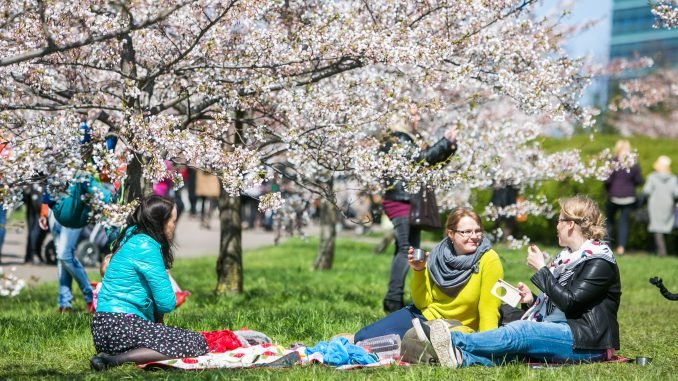
Japan is increasingly becoming familiar with Lithuania, with Lithuanian poultry exporters receiving permits to sell their produce in Japan, the Lithuanian embassy was flooded with requests for information on Lithuanian businesses, while this week Japanese medical research agency AMED President Makoto Suematsu will be visiting Vilnius to sign a cooperation agreement for the fields of oncology and genetics. LRT.lt spoke to Lithuanian ambassador to Japan Egidijus Meilūnas on the two countries‘ developing relations.
The ambassador notes Lithuania and Japan have many similarities, ranging from regional security concerns to an aging society and the challenges related to it. He notes that while Japan has already become one of the chief Lithuanian partners in scientific research and innovation over the past few years, the two countries can still expand their cooperation.
Meilūnas also points out that the visit by President Suematsu is signals great recognition because Japan has only signed similar agreements with the UK, Germany, Finland and Switzerland. Beyond President Suematsu visiting for the signing of a cooperation agreement, it is also notable that for example during the Life Sciences Baltics 2016 forum, the Japanese science and business delegation was only second in size to that of Israel.
Among other venues for expanded relations, the ambassador points to the need to develop trade with the third largest economy in the world, as well as taking advantage of tourism and cultural exchange opportunities. The Lithuanian national sport of basketball appears to be gaining further traction in Japan, with Lithuanian basketball tradition being a matter of interest to Japanese clubs.
In terms of trade, the ambassador points out that Lithuania has had success in gaining entry to Japanese markets, despite the difficulties involved, with Japan becoming one of the most important markets for Lithuania. A variety of Lithuanian exports reach Japan ranging from linen and amber to lasers and optics. Furthermore dairy, meat and bread produce are receiving increasing interest. Lithuanian companies have participated in the Tokyo Agriculture Fair for three years now and last year’s Lithuanian display which highlighted achievements in life sciences have led to the Japanese taking great interest in Lithuanian achievements in biotechnologies and pharmacy. Beyond these developments it is also of note that there is a total of five stores in Japan selling exclusively Lithuanian goods, being set up in Tokyo, Hiroshima, Kyoto, Saitama and Kuji.
The Japanese take interest in Lithuanian history and culture, furthermore having historic links through the story of the famous Japanese diplomat Chiune Sugihara, who was declared Righteous Among Nations, having saved more than 6,000 Jews during his work in Lithuania in 1939-1940 by issuing them Japanese transit visas. A movie about him received a worldwide release in Lithuania in October 2015, being viewed by more than a million viewers in Japan.
The ambassador points out that the number of Japanese tourists visiting Lithuania has risen more than 2.5 times over the past five years, with the embassy actively engaged in promoting Lithuania through more than 50 events annually. Last year more than 22,000 Japanese tourists visited the country, making up the majority of visitors from Asian countries to Lithuania.
Meilūnas laments that there is a lack of a Lithuanian culture attaché in Japan who could enable far greater development of cultural ties. Nevertheless he points out that there is a degree of familiarity with Lithuania in terms of culture through the works of Mikalojus Konstantinas Čiurlionis, Jonas Mekas and Stasys Eidrigevičius, as well as the Ąžuoliukas choir led by Vytautas Miškinis.
Regarding the Lithuanian embassy’s current chief tasks in Japan, the ambassador highlights work in presenting Lithuanian agricultural and food produce in the international fair FOODEX in Tokyo and a presentation of the Lithuanian telecommunications sector to the Japanese government and businesses in late March. Furthermore he points out that the embassy is already intensively engaged with preparations for the Tokyo Olympic Games in 2020. Lithuania is one of the first countries to arrange a training camp in Japan in the city of Hiratsuka.
The ambassador quips that it has become almost the most “Lithuanian” city in Japan, with a section of the city library dedicated to Lithuanian language books and books about Lithuania to open soon, a first in Japan. Furthermore Hiratsuka intends to initiate partnership with Alytus in Lithuania. The embassy has also been engaged with helping Kaunas build relations with the Japanese cities of Yaotsu and Nagoya.

Be the first to comment